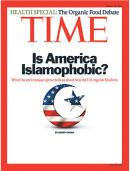An important moment for interfaith discussion in Canada
At first hearing you might expect it would be easy for parliamentarians to vote unanimously to condemn Islamophobia. After all, religious discrimination of any kind is a disease Canadians should be alarmed about.
However, when such a vote was held in Canada in March, 91 MPs voted against the motion, many outside voices (including the EFC) expressed concerns, and there were nationwide demonstrations against and for the motion.
The battle over Parliamentary Motion 103 was like most controversies over Islam – deep, passionate and ugly. MP Iqra Khalid, who proposed the motion, received death threats, and some opponents of M-103 were assaulted at Toronto rallies.
So what does Islamophobia really mean? And why is this discussion important?
The term is a relatively recent invention (possibly 1985 for the first use in print), but it has already made it into the Oxford English Dictionary – "Islamophobia: Intense dislike or fear of Islam, esp. as a political force; hostility or prejudice towards Muslims."
It quickly become an everyday word and made it to the cover of Time magazine in 2010.

Former U.S. president Obama repeatedly attacked Islamophobia, as have various Hollywood stars (see Ben Affleck’s famous rant against Sam Harris and Bill Maher, for example).
You can even get an IslamoPhobia Reporter app for your mobile phone.
There are many academic research projects devoted to the topic, for example The Bridge Initiative at Georgetown University in Washington, D.C., and the Islamophobia Studies Journal from the University of California, Berkeley.
In many circles Islamophobia is "the right word for a real problem," to quote The Bridge Initiative, led by John Esposito, a famous scholar of Islam. It’s a problem also in Canada, most recently and tragically evident in the killings at the Quebec City mosque on January 29.
The Liberal Party of Ontario has condemned Islamophobia, and in that M-103 vote in the House of Commons 201 of Canada’s MPs (including Prime Minister Trudeau) voted to do the same.
So why isn’t everyone in favour of the term Islamophobia and Motion 103?
First, the term implies some form of mental illness, as if critics are unhinged. Influential Canadian figures who agree on this point include Ali Rizvi (author of The Muslim Atheist), Tarek Fatah (Toronto Sun columnist) and Raheel Raza (Muslim author, film producer and public speaker).
They object to the way the term has already been misused to attempt to silence legitimate and necessary criticism of Islam.
They also argue motions like the one sponsored by Khalid can be the opening step in Canada for intended and even unintended suppression of free speech, in line with Muslim blasphemy laws in other countries. A questionable point in some circles, but better considered carefully than simply labelled Islamophobic and then ignored.
Rizvi, Fatah, and Raza have been targeted as Islamophobic, as has the courageous Ayaan Hirsi Ali, an ex-Muslim from Somalia who has called for the reform of Islam. Ali now lives in the United States and has to travel everywhere with security.
Motion M-103 mandates a government study to reduce or eliminate "systemic racism and religious discrimination including Islamophobia," which means as a culture we have an opportunity to think through these issues carefully.
Here are four facts I, as a religion scholar, think must inform the study:
- Truly, Muslims in Canada are often the victims of bigotry, stereotyping and other forms of ignorance and hate. Critics of Islam are sometimes nasty, careless and uninformed.
- Islamophobia is often used to silence legitimate critics and criticism of Islam. Therefore the term to halt bigotry can lead to another form of bigotry.
- There are elements in traditional Islam such as sharia law that threaten Canada’s commitment to freedom and justice.
- The major cause of Islamophobia is Islamic terrorism.
Dealing with these four facts and all related issues will demand the wisdom of Solomon. Let’s agree to pray for those managing this study, and for all Canadians as we seek to love our neighbour as we engage in this public reflection.

James A. Beverley is professor of Christian thought and ethics at Tyndale Seminary in Toronto. For more of his analysis of Islam, see Getting Jesus Right: How Muslims Get Jesus and Islam Wrong (CastleQuay, 2015). Read more of his columns at www.FaithToday.ca/ReligionWatch.